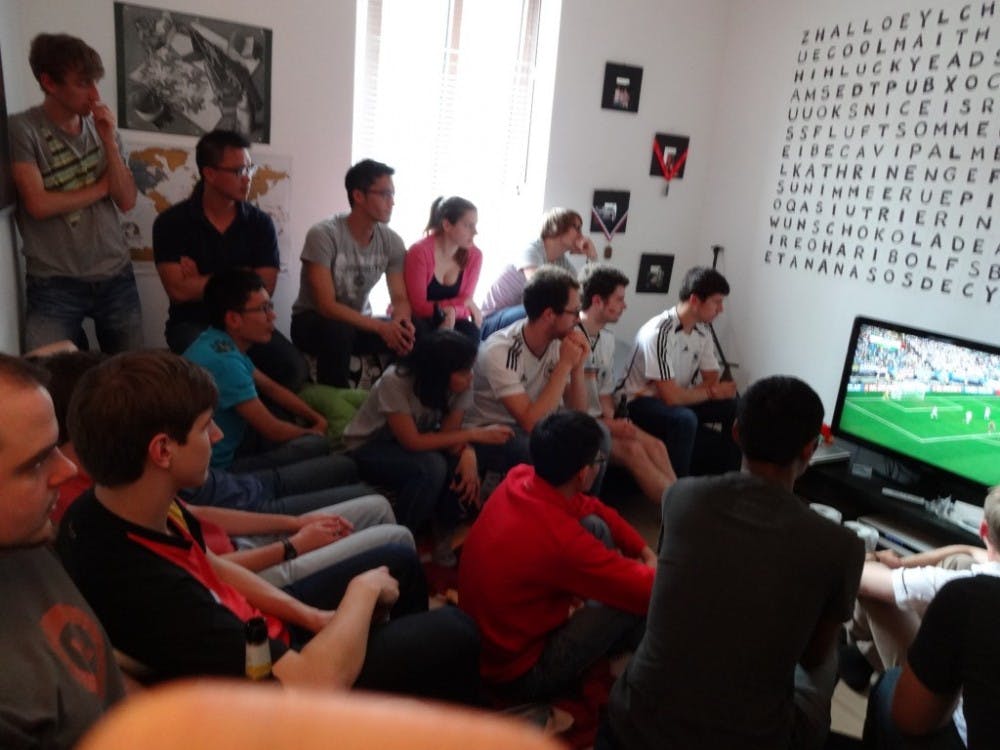The World Cup started June 12 in the soccer-crazed nation of Brazil — the first time in 36 years the tournament is being held in South America. There is a great variety among the 32 teams that qualified for the World Cup, from the United States to traditional powers Spain, Brazil, the Netherlands and Italy to outsiders Algeria, Honduras, Iran and debutant Bosnia & Herzegovina.
Germany has traditionally been competitive in international tournaments, winning the World Cup three times, reaching at least the semifinals in the past three World Cups. However, Germans are not particularly optimistic about the Nationalmannschaft’s chances this time around.
“Normally, the expectations are very high," said Sabine Vollbract, a translator in Aachen, Germany. "We had very high expectations in 2010, but this time we’re not so sure about how strong our team is."
Jannik Borghs, an organic chemist from Weeze, Germany said he agrees.
"No one thinks the National Team can get [very far] past the group stage. This team has so many injured players," he said. "Our offense only has one striker, Miroslav Klose, who is 36 years old. Marco Reus (a starting midfielder) got injured.”
Borghs added that starting goalkeeper Manuel Neuer, widely regarded as one of the best goalkeepers in the world, is just recovering from injury and may not be in top form for the World Cup. These sorts of sentiments are quite different from the habitual optimism seen in America, where it’s much more common for sports fans to continually have high expectations for their team, even if reality suggests otherwise.
Mai-Thi Nguyen-Kim, a polymer chemist from Hemsbach, Gemany explained these differences.
“If you’re a fan of an American team, you always say, ‘We’re going to win.’ But that’s just not a German thing," Nguyen-Kim said. "I wouldn’t say we’re pessimistic. We’re realistic.”
In addition to these reservations, Germany is in the “Group of Death,” the term given each World Cup to what grouping of four teams is deemed the most difficult. Group G, comprising Germany, Portugal, USA and Ghana, is expected to be an extremely competitive group. Germany is still expected to be one of the top two teams after round-robin play and advance to the next round, but some might fancy America to be the second team out of the group.
“Some might cheer for America. Many people do not like [Portuguese controversial star Cristiano] Ronaldo on TV. [Ghanaian] Kevin-Prince Boateng, in a friendly, injured Michael Ballack right before the World Cup in 2010 [causing him to miss his final World Cup], so we don’t like him,” Vollbracht said.
Although Germans aren’t quite as excited for this World Cup Germans are still watching the World Cup en masse. Nguyen-Kim all said she's not a huge soccer fans, but will absolutely watch all the matches involving Germany, and occasionally some others as well.
“Nearly everybody has to watch, because everybody talks about them. For Germans, it’s the only opportunity to show your patriotism and national pride. Everyone can sing German fan songs — there’s no opportunity when there’s no World Cup,” Borghs said.
Nguyen-Kim said she agrees.
“We’re the least patriotic country in the world. The World Cup in 2006 (hosted by Germany), it was a turning point. Before, if you carried around a German flag, you were called a Nazi. If it’s not during the World Cup, you would never have a [big] flag in your yard," said Nguyen-Kim.
Nguyen-Kim also noted that, generally, Germans are very reserved and stoic, but the World Cup is an opportunity to release emotion that is socially unacceptable to release at other times.
“For the last few weeks, every single show has been soccer-themed. Science shows, game shows, everything has been either about soccer or about Brazil,” Nguyen-Kim said.
Whether or not Germany outdoes its modest expectations, the entire country will eagerly gobble up every pass, foul, shot and goal. Across the country, all eyes will be on the ball.


